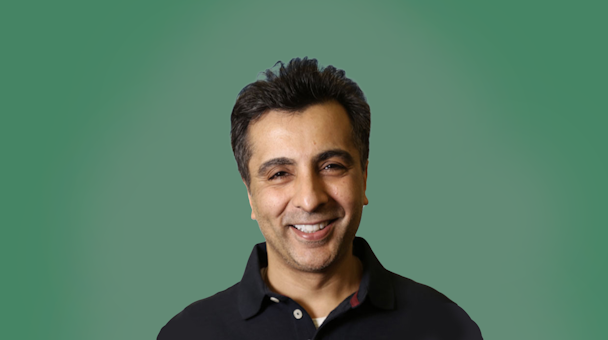Accenture Interactive UK lead Pritesh Gadhia: ‘We need to be more than wrapping paper’
The Drum catches up with Accenture Interactive’s UK lead Pritesh Gadhia, who tells us about the company’s plans for 2022, how it’s adapting to new leadership and how it can find further growth.

Accenture Interactive’s UK lead Pritesh Gadhia discusses expansion plans and getting team culture right
They tend not say it aloud, for fear of appearing unsubtle, but agency leaders are constantly thinking about their rivals. Advertising, after all, offers many arenas for competition – from head-to-head account pitches and the talent market to award shows and industry fame.
If you spend your days speaking to those agency leaders, certain names tend to be mentioned a lot – names such as Accenture Interactive. Accenture Interactive-owned Karmarama, for example, had one of the best win rates in the UK (83.3%), according to the latest AAR pitch report. Since the consultancy-cum-agency network emerged as a major player in the middle of the last decade, it’s become one of the names to beat.
Its UK lead, Pritesh Gadhia, swears he’s not worried, though. ”I see competition in different elements of what we do, whether that’s optimization or martech platforms. But when I think about what we really want to be known for – global marketing transformation – there just aren’t those people that can have upfront conversations or relationships with a board and have the breadth of Accenture’s technology and consulting practices.”
Cultural shifts
Gadhia has been with Accenture for over 20 years, long enough to experience its shift from an ”blue suit, white shirt and blue tie” consulting business to a home for creatives and developers.
”We’ve all been required to change over the last 10 to 20 years. We are much more diverse, not just in terms of ethnicity or [gender] but in terms of the diversity of our thinking and our creativity,” he says.
Gadhia recalls interviewing candidates to join the then-nascent Accenture Digital division in 2013, and wondering how interviewees that didn’t match its corporate mold could ever fit in. ”I interviewed somebody in the analytics and SEO space, a wonderful chap who had curly hair, a flowery shirt and burgundy trousers. But I sat there, listening to him, listening to his knowledge and his experience, the thinking he brought to the table compelled me to bring him on board. And he made a massive impact.”
In contrast, he says the task now is to marshal the diverse forces available to Accenture Interactive. ”I have 13 different brands, which all bring something slightly unique and different, and my challenge as a leader is to work out how to get the best out of that.”
Over the years, that’s meant marrying ”creative talent and creative ways of working” to the Accenture ”machine.”
Gadhia says the success of that process has depended on ”our ability to adapt as leaders and have a level of understanding and empathy ... but also to recognize, bluntly, what works at Accenture does work. It’s been immensely successful.”
Just because a company may be an ”oil tanker,” he says, doesn’t mean it can’t be more agile in the future.
Demand for transformation
Although his prior gigs included a spell at auditors PricewaterhouseCoopers (PwC) rather than buzzy creative shops, and he names Sir Alex Ferguson as a guiding light before any adman, Gadhia is no stranger to modern marketing. A berth within Accenture’s earlier digital businesses gave Gadhia an eyewitness view of clients as they contemplated large-scale digital transformations for the first time, and as demand for expertise in that area has risen in recent years, he’s been able to draw on that experience.
”We’ve pioneered the standard on customer experience at scale, connecting sales and service marketing – that intersection between creativity, technology and data together with culture. Growth has never been more important, but it’s harder to find because there’s been so much change.
”What we’re seeing through our clients is a real hunger for identifying new areas of growth, new opportunities and, to some extent, to reinvent themselves. What I want us to be known for is taking new ideas and scaling them, for discovering new markets.”
That ”real hunger” helped Accenture’s communications, media and technology divisions – of which Interactive is a major part – increase revenues 32% in the first quarter of this year, contributing over $3bn to the parent company’s balance sheet.
Though he says ”nothing’s imminent,” Gadhia suggests that new acquisitions may form part of its expansion plans in 2022.
”We are always on the lookout as our offerings evolve and as we scale for skills ... companies with the right skills and profiles will absolutely help us. We’re certainly not shying away from that activity or that agenda.”
With the departure of Brian Whipple, and the appointment of David Droga as chief executive and Nick Law as global design lead, Accenture Interactive has seen yet more internal change. But despite Droga’s own creative reputation, Gadhia says the company won’t be unduly focused on advertising.
”David will drive creative excellence, customer experience and business innovation. He wants us to stand head and shoulders above other agencies – to be known for what we can do and not known for what we were.
”Cracking adverts are great ... but we need to be more than wrapping paper. We help companies become the best versions of themselves.”

